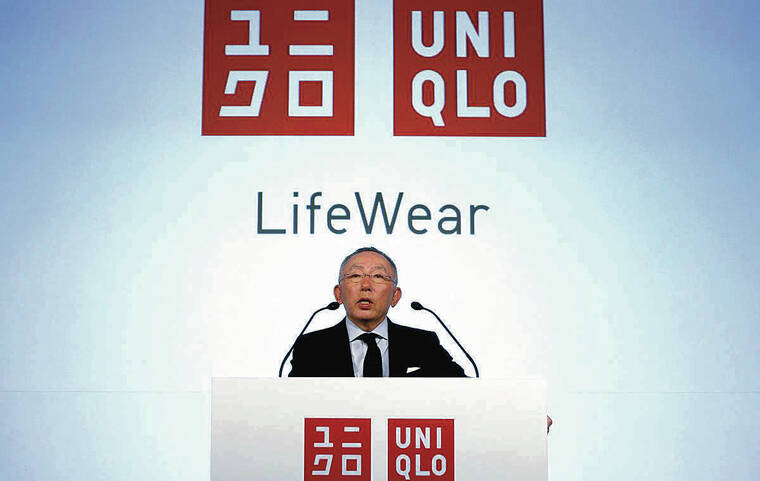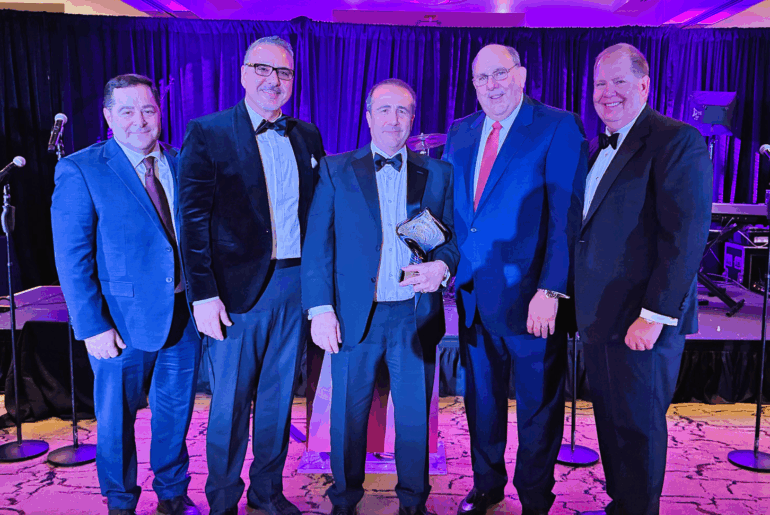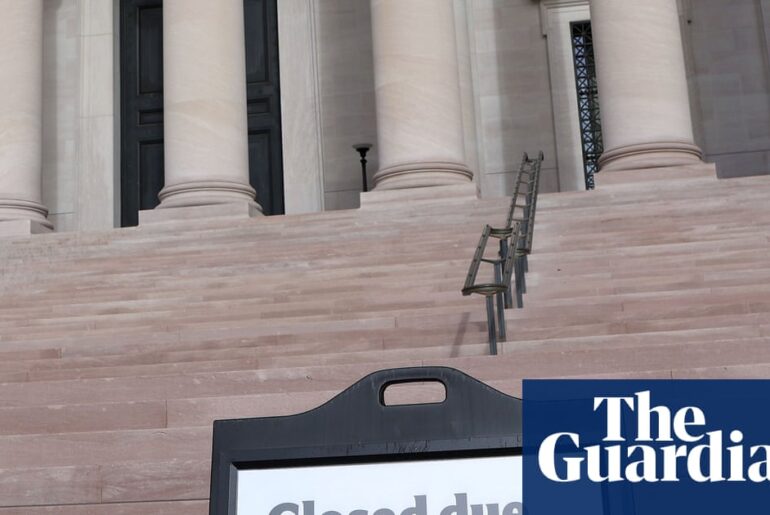The billionaire owner of Kapalua Golf, and several homeowners’ associations, are accusing Maui Land &Pineapple Co. of mismanaging West Maui’s water supply, causing increased rates, water shortages and wildfire conditions that hurt residents and businesses.
Tadashi Yanai, founder of clothing giant Uniqlo and owner of the Kapalua Plantation and Kapalua Bay golf courses; three homeowners associations; and a farm allege that MLP is neglecting to maintain the Honokohau Ditch System, according to the civil complaint filed in Maui Circuit Court on
Monday.
The 60-page civil action seeks injunctive relief and adherence to the plaintiffs’ interpretation of the Water Delivery Agreements.
MLP told Kapalua Golf, run by Yanai’s Honolulu-based TY Management, and the associations that there is not enough water to serve their needs, repeatedly claiming that water is scarce “due to low precipitation in the Puu Kukui water shed,” according to the complaint.
“But that statement is false,” the complaint said. “Precipitation in the Puu Kukui water shed is anything but ‘low.’
“The Puu Kukui region receives an average of 225 inches of rain per year and the annual mean discharge of the Honokohau Stream was slightly higher in 2024 than it was in 2009, when MLP first promised that there would always be enough irrigation water for all of West Maui,” wrote attorneys Grant F. Allison and Addison D. Bonner.
Don’t miss out on what’s happening!
Stay in touch with breaking news, as it happens, conveniently in your email inbox. It’s FREE!
Allison is representing TY Management and Bonner represents the homeowners and farmers involved in the civil
action.
The Honokohau Ditch was jointly funded by MLP and Pioneer Mill Co. to bring water diverted from Honokohau and Honolua watersheds into drier lands to support pineapple and sugarcane agriculture, according to the state Department of Land and Natural Resources’ Commission on
Water Resource Management.
After Pioneer Mill closed in 2000 and Maui Pineapple Co. in 2009, water has been diverted by the ditch to support nonpotable needs of the Kapalua Resort area and the Mahinahina Water Treatment Facility.
The system covers an area of 11.46 square miles from 5,780 feet elevation to the sea. The longest flow path in Honokohau is 11.4 miles in length, according to the state.
Race Randle, CEO of Maui Land &Pineapple Co., told the Honolulu Star-Advertiser in a statement that the company received and is reviewing the “complaint filed by the golf courses,” which he said appears to be a continuation of their efforts to compel the use of water for irrigation when West Maui is experiencing a historic drought.
“Having tried and failed to get the regulatory agencies to force this irresponsible water use, the golf courses, unfortunately, turned to the courts,” Randle said. “We are following the clear guidance from the Commission on Water Resources Management to prioritize streamflow and traditional and customary uses, followed by delivery to the County of Maui to provide drinking water for Lahaina. We will continue to follow CWRM’s guidance.”
TY Management, Plantation Estates Lot Owners’ Association, Association of Apartment Owners of Coconut Grove on Kapalua, Association of Apartment Owners of the Ridge at Kapalua and Hua Momona Farms LLC are the plaintiffs
suing the landowner.
“They’ve (MLP) cut water deliveries, raised rates without explanation, and continued new development projects — despite claiming water shortages. These actions have increased wildfire risk and disrupted homes, farms, businesses, and even major events like the Sentry PGA Tournament which contributes approximately $50M annual to Maui’s economy,” read a statement from
TY Management, noting it has invested over $10 million in conservation and alternative water infrastructure.
The complaint alleges that in August and September 2024, MLP notified TY Management about a “reduction in non-potable water availability and increased rates,” citing damage to the Ditch System from storms in 2018 as justification for the rate increase and blaming the water shortage on the Commission on Water Resource Management interim in-stream flow standards and low rainfall.
“MLP notified its other customers, including HWS (Hawaii Water Service), about increases in rates around this time as well. This notification came six years after the storm MLP mentioned; five years after the (Commission on Water Resource Management) began evaluating the current interim instream flow standards (IIFS) for Honokohau Stream; four years after MLP informed the media that it had finished its repairs; and four years after MLP stated to the PUC that it ‘has not had issues obtaining additional non-potable water from the Honokohau Ditch in the past,’ ” the plaintiffs’ attorneys wrote.
The lawsuit lists the impacts water shortages and restrictions have had on the plant life, grass, and crops grown by the farmers and homeowners involved.
Hua Momona owns and operates Hua Momona Farms, a 25-acre operation that cultivates, harvests and distributes field crops, micro-greens, trees, and sod, according to the complaint. The nonprofit organization gets all of its water from MLP’s Ditch System.
Hua Momona said it prepares hot meals “using its own produce and other locally sourced ingredients,” which it sells at below-market rates to its partner nonprofit organization.
That nonprofit has served more than 80,000 meals to those affected by the Lahaina wildfires. The group also partnered with Treecovery Hawaii to support reforestation efforts after the fatal fires.
On June 19, HWS issued Hua Momona a written warning for “exceeding usage limits during a Tier 4 restriction period.”
“That same day, HWS technicians came to the Farm and informed Hua Momona that its non-potable water meter was being removed — an action that would have shut off the Farm’s access to irrigation water and terminated its agricultural and charitable activities and missions. The technicians left the meter in place that day, but the threat of an instant water cut off remains,” read the complaint.
The “inadequate or unreliable water supply” allegedly threatens Hua Momona with the
“imminent loss” of crops; the collapse of its meal-provision program, community events, and Lahaina reforestation and rebuilding initiatives.
The Plantation Estates Lot Owners Association represents homeowners of a subdivision developed and sold by MLP. PELOA is suing MLP because they believe the landowners water management “increased the risk of wildfires in Kapalua, and because their properties are damaged, and their property values diminished, by MLP’s failures.”
To maintain a single-family dwelling on their properties, PELOA members must use more than 50% of their lots for agricultural purposes, according to the complaint.
Lot owners grow grow a variety of crops, trees, flowers, gardens, and orchards on their properties, “including but not limited to” avocados, starfruit, guava, banana, papaya, lemon, lime, orange, and tangerines.”
The association gets water from HWS for agricultural activities, landscaping, plantings, and to nurture Cook Pine trees.
Starting last year, MLP’s water restrictions allegedly have forced PELOA and its members’ use of irrigation to be
“restricted or prohibited.”
“Out of the 154 days immediately preceding the filing of this Complaint, PELOA and its members (as well as all Plaintiffs) have been restricted to using no irrigation water for 136 days, and restricted using only forty percent of their historical irrigation water usage for the remaining 18 days,” read the complaint, noting crops and plants are dry, dead and flammable.







